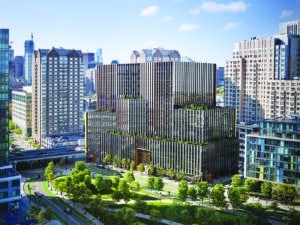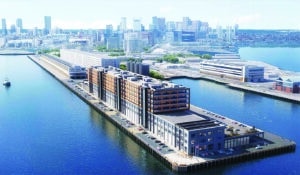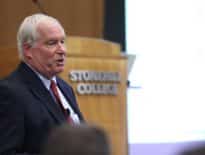Life science real estate in Massachusetts used to mean a tightly-defined section of East Cambridge in the backyard of Massachusetts Institute of Technology and a handful of suburban R&D campuses.
Today Greater Boston’s life science market spans nearly 27 million square feet and emerging Kendall Squares stretch from the edge of Boston Harbor to a growing list of suburbs.
A majority of the nation’s 10 largest life science landlords, led by industry leader Alexandria Real Estate Equities, have substantial holdings in Greater Boston, many carving out dominant positions in specific submarkets. And just as industry clusters matter to the biotech industry, they shape developers’ strategies to acquire dominant positions in local submarkets and give tenants a range of options in an industry that’s known for its accelerated relocation and expansion timetables.
Using data from brokerages Newmark, JLL and Colliers International, plus information from tenant and landlord SEC filings and earnings presentations, Banker & Tradesman has compiled a look at some of the most active life science submarkets and what’s in the pipeline.
East Cambridge
Developers to Watch: Alexandria Real Estate Equities and BioMed Realty
Alexandria and BioMed have battled for landlord supremacy in the global life science hub of Cambridge for more than a decade. Backed by Blackstone’s Real Estate’s deep pockets, BioMed picked up a 2.3 million-square-foot portfolio from Brookfield in March for $3.45 billion. At the same time, it’s pursuing new development at Kendall Square’s last vacant development parcel, 585 Third St., where it’s proposing a 550,000-square-foot office-lab tower.
THEY SAID IT:
“Demand remains high in Kendall Square and East Cambridge, where many of BioMed Realty’s assets are clustered. The submarket continues to see strong levels of leasing activity, while in tandem the availability of space in the area continues to tighten. In response to this surging demand, BioMed is increasing its Cambridge and Boston development pipeline – by at least 2.2 million square feet – to provide our existing tenant base with more optionality for growth within our portfolio, while offering newer tenants high-quality, flexible lab space where and when they need it.”
— Bill Kane, president of East Coast and United Kingdom markets, BioMed Realty
WHAT’S NEXT:
Alexandria has found recent opportunities for growth in East Cambridge through acquisitions, including the pending $815 million purchase of 1 Rogers St. and One Charles Park in a partnership with The Davis Cos. Following the scheduled closing in December, the developers plan to convert 400,000 square feet into R&D space for occupancy in 2023, while pursuing additional development on the property. Alexandria says it’s in talks with life science companies for 100 percent of the new lab space.
Cambridge Crossing

Image courtesy of Ennead and Jacobs Consultants
Developer to Watch: DivcoWest
Portfolio: 2.1 million square feet under construction at 250, 350 and 450 Water St.
After acquiring the 43-acre former rail yard and jumpstarting stalled development plans, DivcoWest is creating an entire new biotech-focused neighborhood at the crossroads of Boston, Cambridge and Somerville. Opportunities for new construction of custom lab space prompted pharmaceutical giant Sanofi to consolidate its local real estate footprint in 900,000 square feet at two buildings at Cambridge Crossing scheduled for completion later this year. Bristol Myers Squibb, Philips, Cerevel Therapeutics and Thrive Earlier Detection followed Sanofi’s lead in committing to leases.
WHAT’S NEXT:
DivcoWest broke ground this summer on a speculative 10-story, 375,000-square-foot life science building at 441 Morgan Ave.
West Cambridge

Photo courtesy of Newmark
Developer to Watch: Healthpeak Properties
Healthpeak Properties clearly sees opportunities for more life science growth at the northern terminus of the MBTA’s Red Line. The Denver-based REIT has spent nearly $1.2 billion on acquisitions in the Alewife submarket, including a controlling interest in Cambridge Discovery Park where it’s eyeing additional development. And it’s partnering with King Street Properties on a new 160,000-square-foot lab building at 101 Cambridgepark Drive.
THEY SAID IT:
“The [Cambridge Discovery Park] purchase came with some vacant land and excess [floor area ratio]. In terms of the purchase price, we like the deal on a standalone basis. The cap rate made a lot of sense. The geography made sense. But this added benefit of having excess land on the campus that could be densified with additional entitlements over time was pretty intriguing to us.”
— Scott Brinker, Healthpeak Properties chief investment officer, Q2 earnings presentation
WHAT’S NEXT:
This month’s $180 million acquisition of the Cambridge Highlands campus gives Healthpeak a steady source of current income and upside potential for future redevelopment. Raytheon BBN Technologies leases the R&D campus for another five years, giving Healthpeak time to design and pursue a redevelopment of the low-rise buildings and parking lots off Concord Avenue.
Lexington

Photo courtesy of King Street Properties
Developer to Watch: King Street Properties
Portfolio: 900,000 square feet
The Route 2 corridor to Lexington has been a well-traveled passage for Cambridge biotech firms looking for expansion as they commercialize products. King Street Properties has helped Lexington maintain its high profile as a suburban life science destination with its redevelopment and expansion of the Hayden Research Campus, and has attracted a Lexington tenant roster that includes Takeda, Kaleido Biosciences, Dicerna Pharmaceuticals, Wave Life Sciences and UniQure.
THEY SAID IT:
“The town of Lexington’s position in the Massachusetts innovation economy has experienced a powerful evolution since the 1960’s when Lexington was considered one of the logical first stops for Cambridge-overflow real estate activity. Today, Lexington has enough critical mass of science-based employers that it is a preferred location in its own right. King Street invests heavily in Lexington and we plan to pursue additional projects there in the future.”
— Stephen Lynch, co-managing partner, King Street Properties
WHAT’S NEXT:
Lexington officials are promoting life science expansion in the Hartwell Avenue commercial district on the west side of Route 128, recently doubling maximum building heights to 115 feet to encourage development of lab buildings. Trammell Crow Co. is the first developer to take them up, proposing a 335,000-square-foot office-lab building at the Quality Inn & Suites hotel property at 440 Bedford St.
Boston Seaport District

Image courtesy of SGA
Developer to Watch: Related Beal
Cambridge-based Vertex Pharmaceuticals’ decision to move its headquarters to Boston’s Fan Pier in 2011 was the opening salvo in the Charles River battle of biotech, but additional life science migration took years to materialize. Now Related Beal, Alexandria Real Estate Equities, The Davis Cos., Marcus Partners and Breakthrough Properties all are contributing to the accelerating development pipeline that now stands at 2.5 million square feet, according to JLL research. Related Beal has 1.7 million square feet of existing life science space in the Seaport and is proposing nearly 500,000 square feet more at its proposed 1.1 million-square-foot Channelside development at 244-284 A St.
THEY SAID IT:
“The Seaport District has become a tremendous life science hub over the past several years and Related Beal is proud to play a significant role in that growth. We are confident the strong momentum in this neighborhood will continue and we are committed to our mission of building state of the art research and development space for leading biotech companies to create life-saving medicines every day.”
— Stephen Faber, executive vice president, Related Beal
WHAT’S NEXT:
The Davis Cos. is repositioning the 88 Black Falcon terminal for life science tenants after receiving approval for a four-story, 327,000-square-foot addition to the former Army repair facility.
Watertown
Developer to Watch: Alexandria Real Estate Equities

Steve Adams
Newly-developed lab buildings along East Watertown’s Arsenal Street corridor are attracting rents seen in Kendall Square just a few years ago, and industry leader Alexandria Real Estate Equities isn’t finished with its Watertown growth plans. Watertown’s rising profile in life science has prompted other developers to snap up local landmarks from the Mount Auburn Club to Russo’s marketplace for future lab projects.
THEY SAID IT:
“We clearly made a big move with the Arsenal on the Charles and what we’re doing to redevelop and develop that. The Watertown Mall is kind of an adjacency, and what you’re looking at is kind of a megacampus. We’re seeing some great R&D continuing to favor that market.”
— Joel Marcus, executive chairman and founder, Alexandria Real Estate Equities, q2 earnings presentation
WHAT’S NEXT:
The $130 million acquisition of the Watertown Mall property gives Alexandria a new opportunity for growth just a stone’s throw from its Arsenal on the Charles complex, although Alexandria has yet to submit redevelopment plans to local officials. The outlook for the Arsenal campus is clearer, with plans for two new lab buildings totaling 215,000 square feet approved by the Watertown planning board in July.




 |
| 

